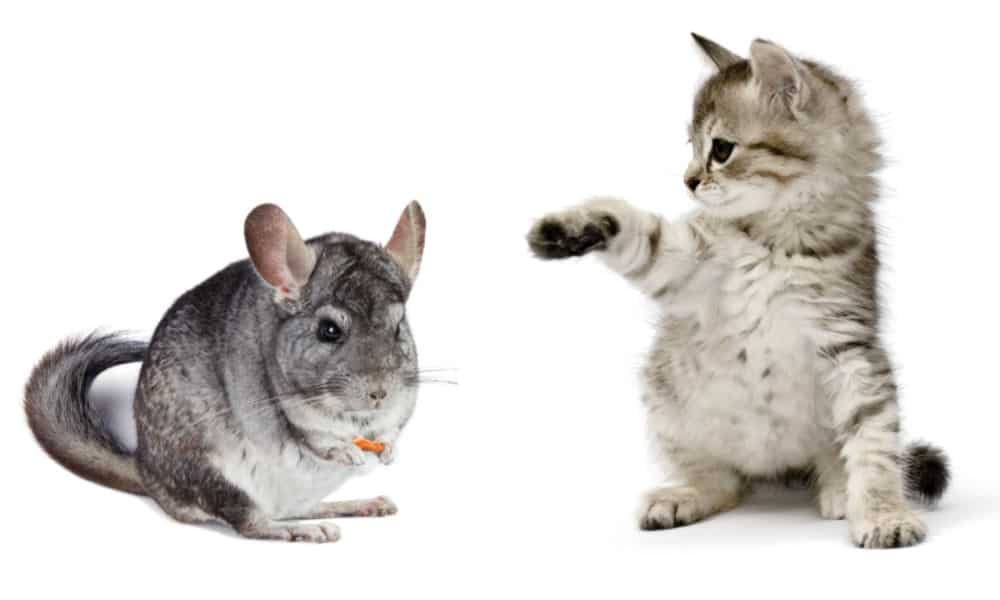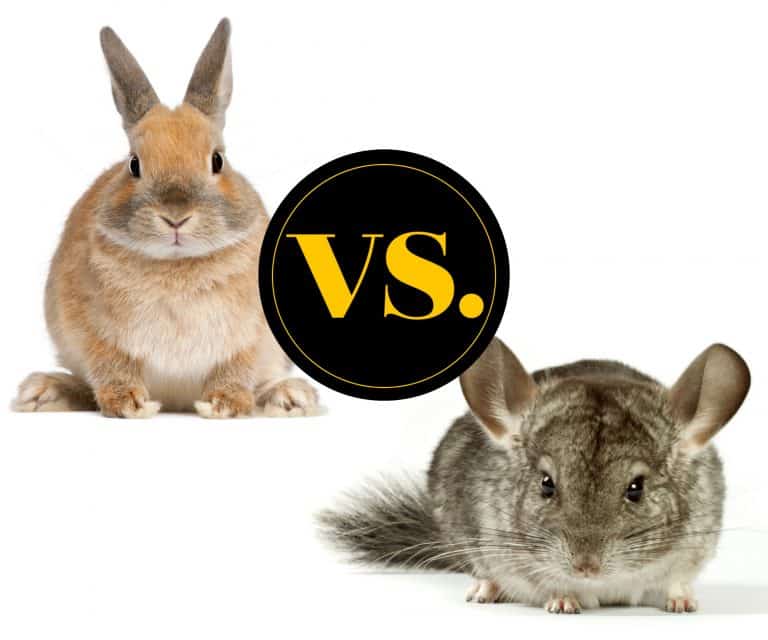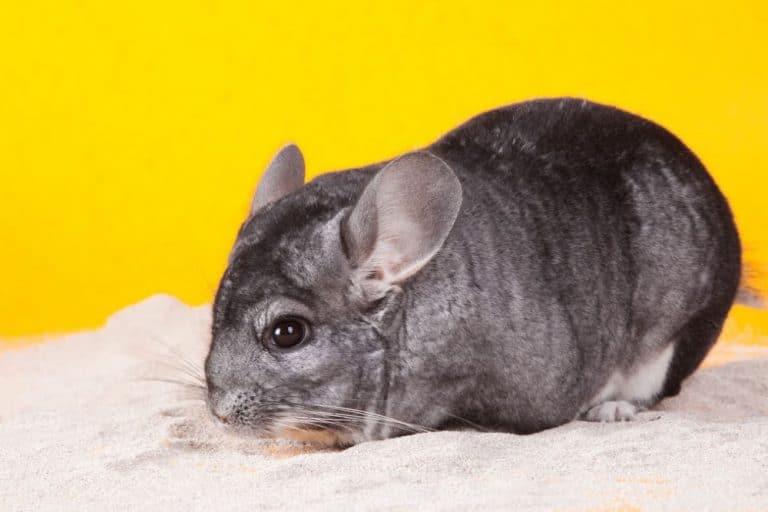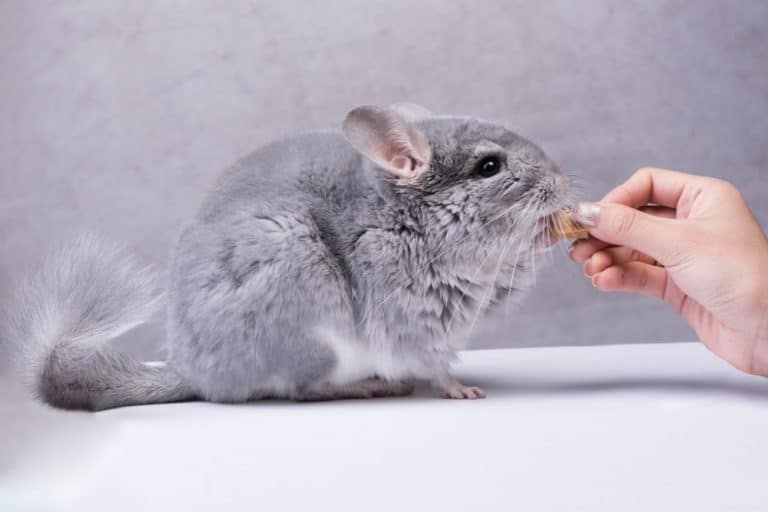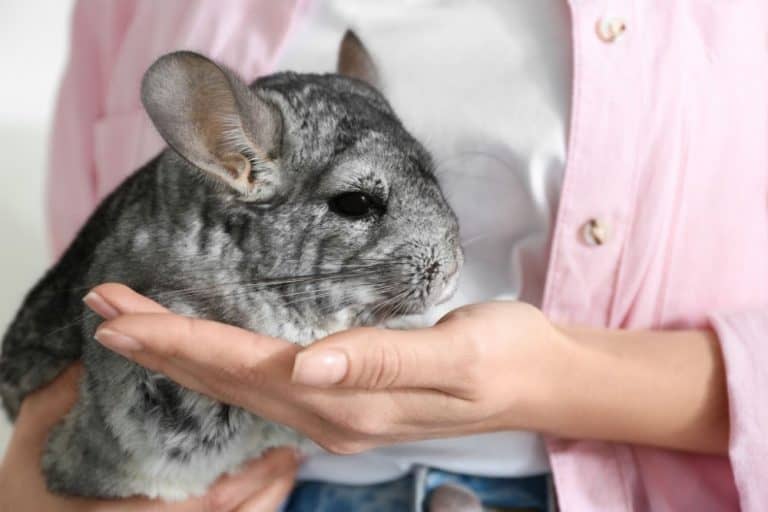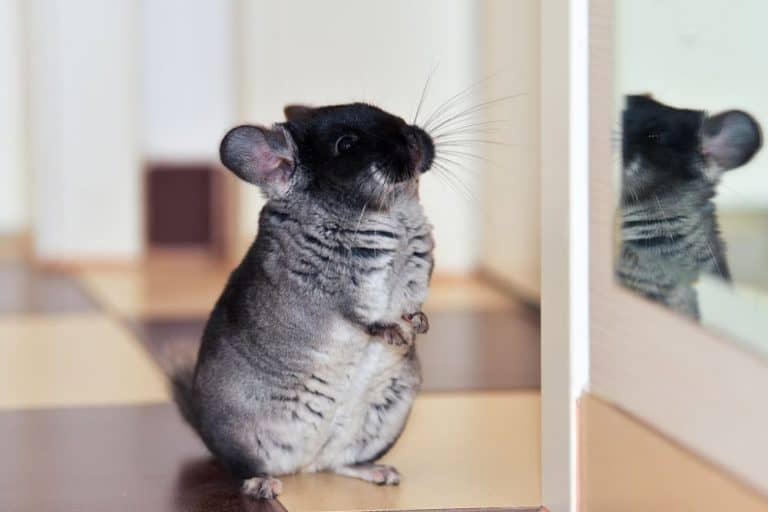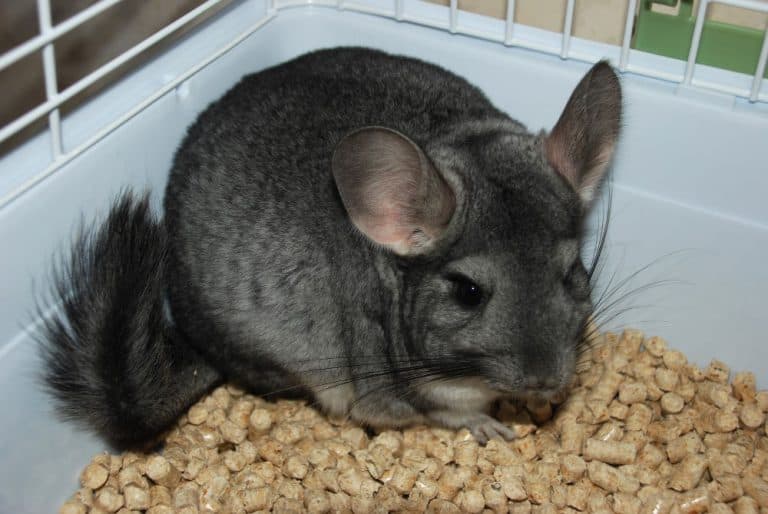A Guide to Introducing Your Chinchilla and Cat
If you own a cat and a chinchilla, you may be wondering whether to introduce your pets to each other. Some people do have households where cats and chinchillas can co-exist peacefully; it all depends on your cat’s personality. Cats who are laid back and less interested in hunting are likely to tolerate a chinchilla and won’t see it as prey. Other cats, especially younger ones, are likely to pounce on anything that moves and may chase and hunt down your chinchilla.
It’s also worth noting that chinchillas are very dominant and can become aggressive when provoked. There have even been cases of chinchillas injuring cats by attaching them when cornered.
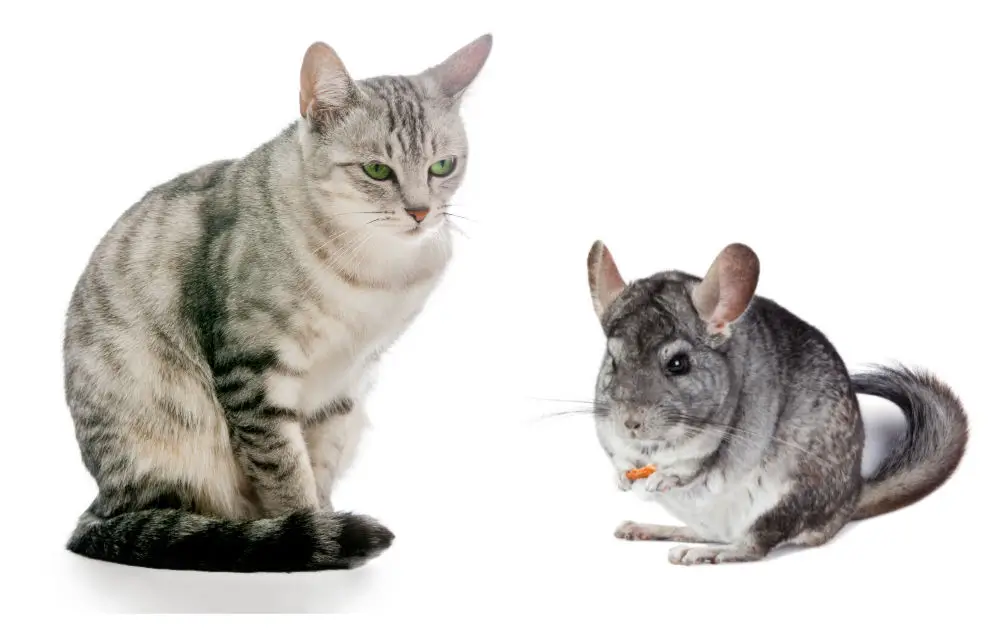
There are many things that you’ll need to consider before introducing your chinchilla and cat. This article will help you to decide whether or not to go ahead with the introductions. We’ll also look at whether a chinchilla can kill or hurt a cat.
Assess Your Pet Personalities
Before deciding whether it’s a good idea to introduce your chinchilla to your cat, you’ll need to assess their personalities to see whether they are likely to get on. Sometimes cats and chinchillas can live relatively peacefully in the same home, but this depends on both animals’ personalities and temperaments.
Can a Chinchilla kill or hurt a cat?
It is highly unlikely that a chinchilla will kill a cat as it is not equipped with the correct type of teeth or jaw structure to kill a cat. However, they do have sharp teeth that could hurt a cat if they choose to attack.
Chinchillas can be dominant and territorial animals, and some pet owners may worry that their chinchilla could injure their cat. While there are cases of this happening, it’s more likely that your chinchilla is the one to be injured.
Chinchillas do have very sharp teeth, and if provoked or cornered, some chinchillas may attack a cat. If a chinchilla was to bite a cat hard enough, it could break the skin. It’s unlikely that a chinchilla would be able to kill a cat as it hasn’t got the right teeth or jaw structure for doing so.
If a cat were chasing a chinchilla, its natural instinct would be to run away rather than turn and fight.
If you decide to introduce your pets, you should carefully monitor your chinchillas’ behavior and look for signs of aggression. Chinchillas are likely to become aggressive if they feel threatened, stressed, and scared. A cat could make you chinchilla feel this way. Chinchillas can naturally become more aggressive around the time of sexual maturity. Watch for aggressive behaviors and make sure that your pets aren’t a danger to each other.
There are several signs of aggressive behavior in chinchillas that you should look out for. These include teeth chattering, growling, and urine spraying.
Can a Cat Kill a Chinchilla?
It’s important to realize that cats are naturally hunters and chinchillas are prey animals. Some people would say that you should never introduce these two pets, others have cats and chinchillas who are well bonded and play together peacefully.
Laidback cats are less likely to hunt the chinchilla and may just ignore it. Other cats are inquisitive and want to have a good look and a sniff at the chinchilla. Some cats may even be scared of your pet chinchilla.
If you have a cat who’s an active hunter, then it’s a good idea to keep your chinchilla well away from your cat. In this situation, you should keep your cat away, don’t even let it in the same room as the chinchilla’s cage. A cat can easily terrorize a chinchilla and cause it lots of stress by reaching its paw through the cage’s bars. Even if the cat is unable to get to the chinchilla, it will frighten your pet by staring at it.
If a cat wanted to, it could seriously injure or even kill a chinchilla. You should never leave these two animals together without supervision. Animals of different species find it hard to understand each other. Your cat may just be being curious or wanting to play with the chinchilla, but the chinchilla isn’t likely to understand this and could get very scared.
Observe Your Pets Carefully
If you do decide to introduce your chinchilla and cat, you should do so very carefully and slowly. Let them get used to each other from a distance before you introduce them. You’ll need to supervise the meeting very cautiously. It’s best to keep the chinchilla in its cage, so that you know it’s safe and let them meet through the bars. This will allow you to get a reaction from the cat, and you’ll feel more confident that things will go well when they do meet.
When you give your chinchilla free time out of its cage, you should put your cat in a different room unless you are very confident that it’s not going to go after the chinchilla. Even if your cat is laid back, never leave them together unsupervised if the chinchilla is out of its enclosure. Your chinchilla could easily become seriously injured if your cat’s behavior changes. Sometimes cats harm chinchillas without even meaning to.
Keeping Your Pets Separate
If you have enough space in your home, you may be able to keep a cat and chinchillas in separate rooms, and they will never have to meet. This is often the best solution as the physical presence of a cat could upset your chinchillas, even if they are safely in their cage. The scent of a cat can be distressing to your chinchilla and will trigger a lot of fear and anxiety. It’s best if you keep your chinchillas away from the sight of cats and away from any sounds and smells of cats and other pets.
Introducing a New Kitten
Many pet owners allow their kitten to spend time with their chinchilla. Small kittens are less likely to pose a threat to a chinchilla then cats are. It’s essential to observe them carefully if they are playing as kittens do have a hunting instinct.
Introducing young animals to each other is often best as this gives them a chance to get used to each other. Many cats and chinchillas end up forming a close bond if they’ve got to know each other from a young age.
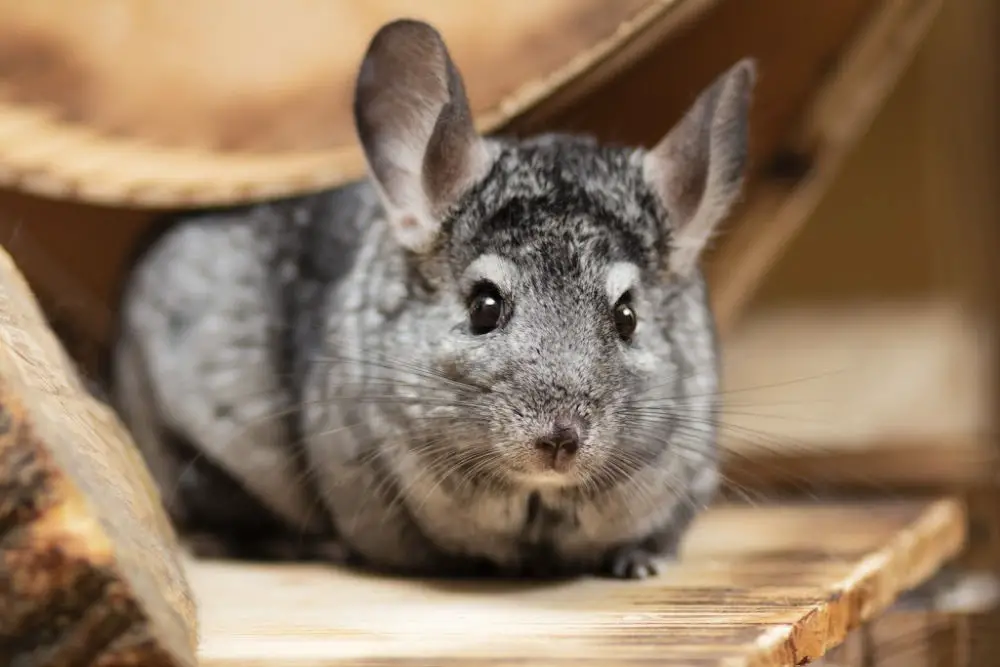
The Spread of Diseases Between Pets
Cats can sometimes be killers by being a carrier of a deadly infection called Pasteurella, sometimes known as snuffles. Cats, dogs, and rabbits can often be carriers without showing any symptoms and without it affecting their health. Pasteurella is a bacteria that can cause upper respiratory infections and can be fatal in chinchillas. This fact alone is one of the main reasons that people with cats keep them separated from their chinchillas
Conclusion
It’s best to keep animals of different species apart, where possible, as they are unlikely to understand each other’s behaviors. This could lead to misunderstandings that could result in injury. If you have a pet and decide to get another, its important to introduce your animals to the new arrival slowly and to keep a close eye on how they are reacting to each other.
Remember that cats are hunters and chinchillas are naturally prey animals. A cat could seriously injure or even kill a chinchilla. If you decide to introduce these two animals, it’s better to do so when they are both young. There are cases of cats forming close bonds with chinchillas that they were introduced to while they were kittens.
It’s also important to remember that cats can be carriers of a bacteria called Pasteurella, which could be fatal if passed to your chinchillas.
Related Questions
What happens if you give a chinchilla a bath?
Chinchillas are known for their extremely thick coats. If their coats become damp or thoroughly wet, the fur can become tightly compacted together, creating a big, uncomfortable mass. The dense fur also can be extremely slow to dry, causing your chinchilla to become chilled. It is because of their thick coats that chinchillas need to take regular dust baths. The dust helps to take the moisture out of their coat.
Can Chinchillas drink from bowls?
In theory, yes, they can drink water from a bowl; however, it’s much more preferable for them to drink from a water bottle. Bowls of water get easily overturned, which can make their cage and everything in it wet. There is also a greater risk of your chinchilla getting wet. Their thick fur coats can take a long time to dry out if they become wet, leading to your chinchilla getting chilled.
For more info on Chinchillas, check out some of these posts.

